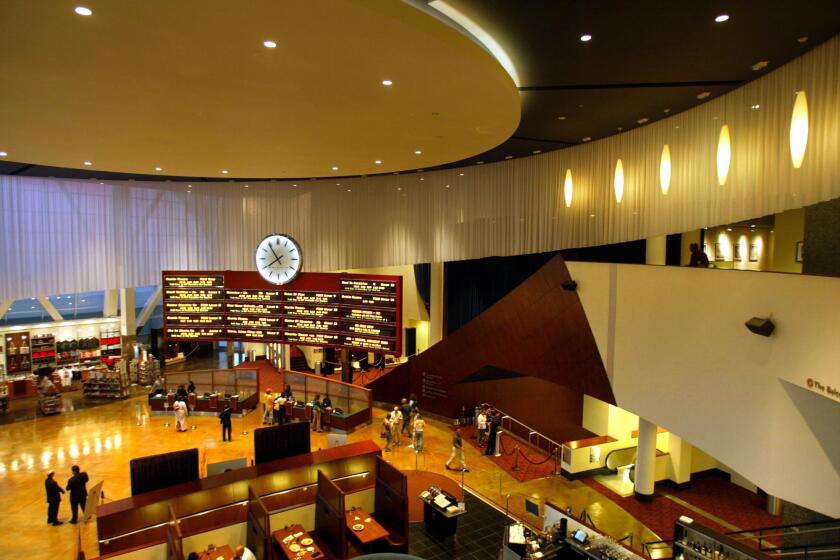Movie theaters face ‘existential’ threat from COVID-19: ‘Without new movies, it’s over’
- Share via
After months of being shuttered, Texas movie theater chain Alamo Drafthouse published a blog post from founder Tim League last month detailing the company’s new coronavirus safety protocols, including mandatory masks and employee temperature checks. The maverick exhibitor’s message to nervous moviegoers was that its theaters would be “safer than a supermarket.”
Whether customers believe that’s true will have a major effect on the movie industry’s return from the COVID-19 pandemic.
About 1,300 domestic movie houses are currently open, including 293 drive-ins, according to data firm Comscore. But the vast majority of the country’s nearly 5,550 indoor theaters remain shuttered, and the recent surge in COVID-19 cases and hospitalizations in multiple states has postponed what was already expected to be a slow recovery. While drive-ins are doing brisk business, indoor theaters are struggling to draw audiences because of a lack of new Hollywood films.
“Twenty days ago, I would’ve said we’re on track,” said David A. Gross, head of movie consultancy Franchise Entertainment Research. “But this latest spike is just awful.”
Studios, meanwhile, are dealing with their own dilemma of when they can start safely releasing blockbusters again.
Christopher Nolan’s “Tenet,” originally expected to open July 17, has been delayed until Aug. 12. Walt Disney Co.’s “Mulan” was pushed from July 24 to Aug. 21. Once those releases were postponed, theater chains adjusted their own schedules. AMC Theatres, the world’s largest cinema chain, delayed plans to open its doors until July 30, after previously targeting July 15. And given the current rise in cases, there’s no guarantee those new dates will stick.
Drive-ins had no big-budget movies to show. Indie film distributors had no indoor theaters to screen in. How necessity, and a pandemic, brought them together.
The sustained closures are taking a huge bite out of the theatrical movie business, effectively quashing the traditional summer box office season that normally accounts for 40% of annual ticket sales. Wedbush Securities estimates that the North American box office will total $4.4 billion in 2020, down 61% from last year. (In 2019, box office revenue was $11.4 billion, a 4% dip from the prior year.)
“Our whole industry is caught in the middle right now,” said Chris Aronson, president of domestic distribution at Paramount Pictures, which plans to release “A Quiet Place Part II” in early September.
John Fithian, president and chief executive of the National Assn. of Theatre Owners (NATO), said his organization has been encouraging the studios to start releasing their big movies next month, though some U.S. states and localities, including Los Angeles and New York, remain in a state of uncertainty.
The “vast majority” of global markets will be open in time for the current release dates for Hollywood movies, he said. Other countries, he noted, have been more effective than the U.S. in controlling the virus, and for a movie like “Tenet,” two-thirds of the box office is expected to be international.
Furthermore, if studios don’t start releasing new movies soon, it could do lasting damage to the industry, he said.
“If the answer is, ‘We’re going to wait until 100% of theaters are open, we’re not going to be there until a year from now when there’s a vaccine,” Fithian said. “This is existential for the movie theater industry. If we go a year without new movies, it’s over.”
Releasing a big movie during a pandemic will be risky, especially for the first major titles to hit theaters. Nonetheless, Nolan, an ardent supporter of theatrical exhibition, and film studio Warner Bros. have remained determined to chart a successful theatrical release for “Tenet.”
“We see this as an important time to work with exhibitors to figure out how to be healthy and responsible at the same time,” said Jeff Goldstein, Warner Bros. Pictures’ president of domestic distribution. “We’re being smart about it.”
Movie theaters might start opening up as soon as mid-June. That’s going to be more complicated than it sounds.
Studios say they’re ready to release films when health officials give the green light. The first wide-release picture to hit theaters will be the Russell Crowe thriller “Unhinged,” expected to debut July 31. After that, Sony Pictures is set to unveil the romantic comedy “The Broken Hearts Gallery” on Aug. 7. Neither is expected to gross significant numbers compared to blockbusters, but they will provide the first true tests of audiences’ comfort level.
“Once theaters can open safely, there’s plenty of product,” said Tom Rothman, chairman of Sony’s motion picture group. “It’s not a chicken-and-egg situation, it’s a safety issue.”
For the theaters, reopening can’t come soon enough. The largest chains — AMC Theatres and Regal Cinemas — remain shuttered. Plano, Texas-based Cinemark opened a handful of theaters in the Dallas-Fort Worth area but will not open most of its 345-theater U.S. circuit until July 24.
Some smaller chains that tried to open early by showing recent releases, like the Vin Diesel action thriller “Bloodshot” and nostalgic classics including “Jaws,” have struggled to make ends meet with those titles. What’s worse, exhibitors’ expenses have increased with the introduction of new sanitation equipment, protective gear and cleaning protocols.
Illinois-based Classic Cinemas opened its 13 locations in the state on June 26 with a lineup of retro screenings. Ticket sales popped the first week, but attendance quickly fell. CEO Chris Johnson decided to close the theaters again on Thursday.
“The older movies just didn’t necessarily cut it,” Johnson said. “You can only have so many showings of ‘Jurassic Park’ and ‘Harry Potter.’ At the end of the day, our livelihood is new movies. We’re going to make sure the new releases are set in stone before we get excited.”
Brock Bagby, executive vice president of B&B Theatres, said he’s faced a similar problem. The Liberty, Mo.-based chain has opened its top 16 locations, but the theaters are only doing about 10% of their normal business. Bagby and his dad recently watched “Jurassic Park” in a 130-seat auditorium with eight people in the theater, he said.
His original plan was to reopen five or 10 theaters a week. But the delay of new releases scuttled that process.
“When the movies got pushed, we decided to take a pause, because it just didn’t make sense,” Bagby said.
Theaters have already started releasing spots showcasing their cleaning and social distancing protocols. Cinemark released a three-minute video demonstrating the company’s contactless ticketing and entry, sanitation equipment, and concession workers behind plexiglass barriers.
Even in places where regulations loosened early, some theaters have held off. Florida theaters were allowed to open with 50% capacity in June. However, the Tampa Theatre, a nonprofit movie palace built in 1926, decided to remain closed. Because its single auditorium seats 1,200, there was no way to open sustainably while also keeping customers safe, even by reducing capacity to allow for distancing, said president and CEO John Bell. Getting 600 people through the theater’s lobby before a showtime would be too dangerous, he said.
“We could probably do more if we could magically teleport people to their seats,” Bell said.
Part of the uncertainty for cinemas stems from the fact that some states haven’t given clear guidance about when they can reopen. Maryland, New York, North Carolina, New Mexico and New Jersey have so far not given reopening dates for cinemas, according to NATO.
After struggling to get answers, the theater owners association, along with several major theater chains, on Tuesday sued New Jersey Gov. Philip Murphy. The group’s complaint said theaters were being unfairly discriminated against in the state, where religious gatherings are permitted with 25% capacity, or up to 100 people, whichever is lower.
The state has “a legal obligation to promulgate orders that treat like entities in a like manner, and not to create arbitrary or irrational distinctions, particularly where First Amendment rights are at stake,” the complaint said.
It’s still unclear how eager moviegoers will be to return to the cinema. According to data from Screen Engine/ASI, 13% of frequent moviegoers say they plan to return to theaters right away, no matter what’s playing, while 29% said they will go when there’s a movie they’re interested in. Still, 18% said they plan to wait until the pandemic is completely over. Frequent moviegoers are those who go six or more times a year, the firm said.
Consumers’ concerns have increased significantly since the recent COVID-19 spikes, particularly among women and older audiences, said Screen Engine/ASI senior vice president Catherine Paura.
Warner Bros. again postpones the release of Christopher Nolan’s “Tenet,” further delaying Hollywood’s summer kickoff because of the coronavirus.
“It’s really all about safety,” Paura said. “If you look at those who are really concerned, what the data says to us is that moviegoing is on pause.”
Studio executives, however, are confident that new movies will be able to turn profits once they hit cinemas, though they’ll have to say goodbye to the $100-million opening weekends that summer blockbusters used to generate. Studios hope that a lack of competition lets such films as “Tenet” and “Mulan” play well into the fall. That would mark a sharp contrast to the pattern for summer movies, which normally do most of their business in the first couple of weeks.
“When there are fewer movies in the marketplace, you can go for a much longer period of time,” Goldstein said. “It’s not about the first day, the first weekend, or the first week. It’s about taking a really long view of it.”
Gross, the analyst, is skeptical about that argument.
“I’m concerned about how deep the audience is,” Gross said. “I don’t think anyone’s ready to let go of 15% to 20% of the audiences.”
Studio executives said they’re impressed by the level of detail in exhibitors’ reopening plans, despite some controversies. AMC Chief Executive Adam Aron initially said the company would strongly encourage, but not require, patrons to wear masks unless mandated by local or state authorities. He quickly reversed course after an online backlash.
B&B’s Bagby said he’s heartened that audiences who have braved his theaters so far have given rave reviews about their experiences.
“The people who have come out to the theater are very appreciative of what we’re doing and the measures we’re taking,” Bagby said. “Hopefully, people are going to get more comfortable and get acclimated to going back to the movies.”
More to Read
Inside the business of entertainment
The Wide Shot brings you news, analysis and insights on everything from streaming wars to production — and what it all means for the future.
You may occasionally receive promotional content from the Los Angeles Times.













